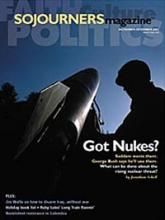Come to the Table
Invite your friends, pass the cookies, and dig into Sojourners. Table Talk discussion guides provide a gathering place for communities to discuss issues of faith, politics, and culturelocal and global. Table Talk offers a smorgasbord of questions (enough for four sessions, if you want to arrange it that way), as well as resources for further study and action. You bring dessert.
Download in
Session I. A New Nuclear Age
"The Bomb is Back" (p. 20)
Perhaps you took to the streets for anti-nuke protests in the '80s. Or maybe you came of age after the Cold War, and Hiroshima seems like ancient history. It'll take all of us, Jonathan Schell warns, to reverse the vicious cycle of proliferation and finally abolish the nuclear threat.
Questions to Consider
1. How have you experienced nuclear danger in your lifetime? What during the Cold War? Do you feel more or less threatened by them now?
2. Are people "on the streets" aware of nuclear proliferation and the new, aggressive U.S. policy? Is it true, as Schell writes, that those who oppose the bomb are back too?
3. How has your denomination or congregation opposed the nuclear arms race? Does your church have a statement on nuclear weapons?
Resources
UrgentCall.org. An initiative to educate the public about the new nuclear threat. (http://www.urgentcall.org)
Read the Full Article
